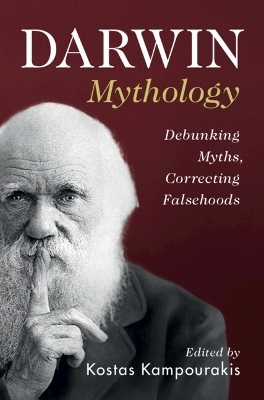
Darwin Mythology
Cambridge University Press (Verlag)
978-1-009-37570-2 (ISBN)
Many historical figures have their lives and works shrouded in myth, both in life and long after their deaths. Charles Darwin (1809–82) is no exception to this phenomenon and his hero-worship has become an accepted narrative. This concise, accessible and engaging collection unpacks this narrative to rehumanize Darwin's story and establish what it meant to be a 'genius' in the Victorian context. Leading Darwin scholars have come together to argue that, far from being a lonely genius in an ivory tower, Darwin had fortune, diligence and – crucially – community behind him. The aims of this essential work are twofold. First, to set the historical record straight, debunking the most pervasive myths and correcting falsehoods. Second, to provide a deeper understanding of the nature of science itself, relevant to historians, scientists and the public alike.
Kostas Kampourakis is the author and editor of several books about evolution, genetics, philosophy and history of science, as well as the editor of the Cambridge University Press book series Understanding Life. He teaches biology and science education courses at the University of Geneva.
Introduction: Myths and Darwin Kostas Kampourakis; 1. That myths are simple falsehoods John Heilbron; 2. That most European naturalists before Darwin did not think that species change was possible Pietro Corsi; 3. That Charles Darwin was not directly influenced by the evolutionary views of his grandfather Erasmus Patricia Fara; 4. That Darwin always rejected the argument from design in nature and developed his own theory to replace it Michael Ruse; 5. That Darwin converted to evolutionary theory during his historic Galápagos Islands visit Frank Sulloway; 6. That Darwin's Galápagos finches inspired his most important evolutionary insights Frank Sulloway; 7. That Darwin was a recluse, and a theoretician rather than a practical scientist Alison Pearn; 8. That Darwin rejected Lamarck's ideas of use and disuse and of the inheritance of acquired traits Richard W. Burkhardt; 9. That Darwin's theory was essentially complete once he came up with the idea of natural selection Alan C. Love; 10. That Darwin delayed the publication of his theory for 20 years, being afraid of the reactions it would cause John van Wyhe; 11. That Wallace's and Darwin's theories were the same, and that Darwin did not reveal Wallace's 1858 letter and theory until he ensured his own priority Michael Ruse; 12. That Huxley was Darwin's bulldog and accepted all aspects of his theory Peter Bowler; 13. That Huxley defeated Wilberforce, and ridiculed his obscurantism, in the 1860 Oxford debate John Brooke; 14. That Darwin's critics such as Owen were prejudiced and had no scientific arguments Nicolaas Rupke; 15. That natural selection can also be accurately described as the survival of the fittest David Depew; 16. That Darwin banished teleology from biology James Lennox; 17. That Darwin's success depended on undermining 'Aristotelian essentialism' James Lennox; 18. That Darwin's theory would have become more widely accepted immediately had he read Mendel's 1866 paper Gregory Radick; 19. That Darwin faced a conspiracy of silence in Lamarck's country Liv Grjebine; 20. That Hitler endorsed and was influenced by Darwin's theory Robert Richards; 21. That sexual selection was Darwin's afterthought to natural selection Kimberly Hamlin; 22. That Darwin's hatred of slavery reflected his beliefs in racial equality Erik Peterson; 23. That the discovery of Australopithecus in 1925 belatedly confirmed Darwin's 1871 scientific prediction of African human origins Emily Kern; 24. That Darwin's theory brought an instant and immediate revolution in the life sciences Shruti Santosh and Anya Plutynski; Conclusion: What inferences about science can we draw from Charles Darwin's life and work Kostas Kampourakis.
| Erscheinungsdatum | 13.12.2022 |
|---|---|
| Zusatzinfo | Worked examples or Exercises |
| Verlagsort | Cambridge |
| Sprache | englisch |
| Maße | 158 x 235 mm |
| Gewicht | 620 g |
| Themenwelt | Geschichte ► Teilgebiete der Geschichte ► Technikgeschichte |
| Naturwissenschaften ► Biologie | |
| Sozialwissenschaften | |
| ISBN-10 | 1-009-37570-9 / 1009375709 |
| ISBN-13 | 978-1-009-37570-2 / 9781009375702 |
| Zustand | Neuware |
| Haben Sie eine Frage zum Produkt? |
aus dem Bereich


